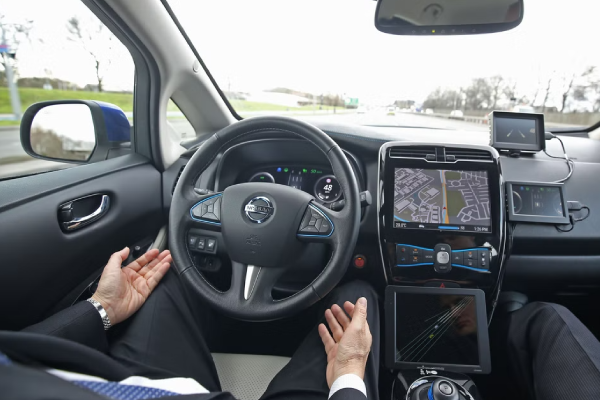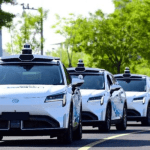The UK Parliamentary Committee says it has begun looking at the development and deployment of self-driving cars.
The Transport Select Committee declared that it is looking into what has to happen in order for them to become more common on public roads.
This will entail examining safety issues and the perception of safety, as well as taking into account the relationship with other road users such as pedestrians, cyclists, and conventional car users.
The committee will examine the progress of research and trials into autonomous and connected vehicles in the UK and abroad, as well as their potential applications in private driving, public transportation, and commercial driving.
Changes to regulations, such as the legal status of the vehicles, insurance, and authorization processes, will also be investigated.
Fully autonomous vehicles are not currently legal in the UK, but automakers are working on developing them.
The Highway Code will be changed on Friday to allow users of self-driving cars to view movies and television shows on built-in screens, but using a phone will still be prohibited.
The code, which provides guidelines and norms for motorists on British roads, will also stipulate that users are not at fault for accidents and that insurance companies are responsible for paying claims.
However, drivers must be prepared to regain control of their vehicles in an emergency.
The development of self-driving vehicles could create around 38,000 jobs in Britain and be worth £41.7 billion to the economy by 2035, according to the Department for Transport.
By 2025, a complete regulatory framework for autonomous vehicles is anticipated to exist.
The UK Parliamentary Committee says it has begun looking at the development and deployment of self-driving cars.
The Transport Select Committee declared that it is looking into what has to happen in order for them to become more common on public roads.
This will entail examining safety issues and the perception of safety, as well as taking into account the relationship with other road users such as pedestrians, cyclists, and conventional car users.
The committee will examine the progress of research and trials into autonomous and connected vehicles in the UK and abroad, as well as their potential applications in private driving, public transportation, and commercial driving.
Changes to regulations, such as the legal status of the vehicles, insurance, and authorization processes, will also be investigated.
Fully autonomous vehicles are not currently legal in the UK, but automakers are working on developing them.
The Highway Code will be changed on Friday to allow users of self-driving cars to view movies and television shows on built-in screens, but using a phone will still be prohibited.
The code, which provides guidelines and norms for motorists on British roads, will also stipulate that users are not at fault for accidents and that insurance companies are responsible for paying claims.
However, drivers must be prepared to regain control of their vehicles in an emergency.
The development of self-driving vehicles could create around 38,000 jobs in Britain and be worth £41.7 billion to the economy by 2035, according to the Department for Transport.
By 2025, a complete regulatory framework for autonomous vehicles is anticipated to exist.
The UK Parliamentary Committee says it has begun looking at the development and deployment of self-driving cars.
The Transport Select Committee declared that it is looking into what has to happen in order for them to become more common on public roads.
This will entail examining safety issues and the perception of safety, as well as taking into account the relationship with other road users such as pedestrians, cyclists, and conventional car users.
The committee will examine the progress of research and trials into autonomous and connected vehicles in the UK and abroad, as well as their potential applications in private driving, public transportation, and commercial driving.
Changes to regulations, such as the legal status of the vehicles, insurance, and authorization processes, will also be investigated.
Fully autonomous vehicles are not currently legal in the UK, but automakers are working on developing them.
The Highway Code will be changed on Friday to allow users of self-driving cars to view movies and television shows on built-in screens, but using a phone will still be prohibited.
The code, which provides guidelines and norms for motorists on British roads, will also stipulate that users are not at fault for accidents and that insurance companies are responsible for paying claims.
However, drivers must be prepared to regain control of their vehicles in an emergency.
The development of self-driving vehicles could create around 38,000 jobs in Britain and be worth £41.7 billion to the economy by 2035, according to the Department for Transport.
By 2025, a complete regulatory framework for autonomous vehicles is anticipated to exist.
The UK Parliamentary Committee says it has begun looking at the development and deployment of self-driving cars.
The Transport Select Committee declared that it is looking into what has to happen in order for them to become more common on public roads.
This will entail examining safety issues and the perception of safety, as well as taking into account the relationship with other road users such as pedestrians, cyclists, and conventional car users.
The committee will examine the progress of research and trials into autonomous and connected vehicles in the UK and abroad, as well as their potential applications in private driving, public transportation, and commercial driving.
Changes to regulations, such as the legal status of the vehicles, insurance, and authorization processes, will also be investigated.
Fully autonomous vehicles are not currently legal in the UK, but automakers are working on developing them.
The Highway Code will be changed on Friday to allow users of self-driving cars to view movies and television shows on built-in screens, but using a phone will still be prohibited.
The code, which provides guidelines and norms for motorists on British roads, will also stipulate that users are not at fault for accidents and that insurance companies are responsible for paying claims.
However, drivers must be prepared to regain control of their vehicles in an emergency.
The development of self-driving vehicles could create around 38,000 jobs in Britain and be worth £41.7 billion to the economy by 2035, according to the Department for Transport.
By 2025, a complete regulatory framework for autonomous vehicles is anticipated to exist.
The UK Parliamentary Committee says it has begun looking at the development and deployment of self-driving cars.
The Transport Select Committee declared that it is looking into what has to happen in order for them to become more common on public roads.
This will entail examining safety issues and the perception of safety, as well as taking into account the relationship with other road users such as pedestrians, cyclists, and conventional car users.
The committee will examine the progress of research and trials into autonomous and connected vehicles in the UK and abroad, as well as their potential applications in private driving, public transportation, and commercial driving.
Changes to regulations, such as the legal status of the vehicles, insurance, and authorization processes, will also be investigated.
Fully autonomous vehicles are not currently legal in the UK, but automakers are working on developing them.
The Highway Code will be changed on Friday to allow users of self-driving cars to view movies and television shows on built-in screens, but using a phone will still be prohibited.
The code, which provides guidelines and norms for motorists on British roads, will also stipulate that users are not at fault for accidents and that insurance companies are responsible for paying claims.
However, drivers must be prepared to regain control of their vehicles in an emergency.
The development of self-driving vehicles could create around 38,000 jobs in Britain and be worth £41.7 billion to the economy by 2035, according to the Department for Transport.
By 2025, a complete regulatory framework for autonomous vehicles is anticipated to exist.
The UK Parliamentary Committee says it has begun looking at the development and deployment of self-driving cars.
The Transport Select Committee declared that it is looking into what has to happen in order for them to become more common on public roads.
This will entail examining safety issues and the perception of safety, as well as taking into account the relationship with other road users such as pedestrians, cyclists, and conventional car users.
The committee will examine the progress of research and trials into autonomous and connected vehicles in the UK and abroad, as well as their potential applications in private driving, public transportation, and commercial driving.
Changes to regulations, such as the legal status of the vehicles, insurance, and authorization processes, will also be investigated.
Fully autonomous vehicles are not currently legal in the UK, but automakers are working on developing them.
The Highway Code will be changed on Friday to allow users of self-driving cars to view movies and television shows on built-in screens, but using a phone will still be prohibited.
The code, which provides guidelines and norms for motorists on British roads, will also stipulate that users are not at fault for accidents and that insurance companies are responsible for paying claims.
However, drivers must be prepared to regain control of their vehicles in an emergency.
The development of self-driving vehicles could create around 38,000 jobs in Britain and be worth £41.7 billion to the economy by 2035, according to the Department for Transport.
By 2025, a complete regulatory framework for autonomous vehicles is anticipated to exist.
The UK Parliamentary Committee says it has begun looking at the development and deployment of self-driving cars.
The Transport Select Committee declared that it is looking into what has to happen in order for them to become more common on public roads.
This will entail examining safety issues and the perception of safety, as well as taking into account the relationship with other road users such as pedestrians, cyclists, and conventional car users.
The committee will examine the progress of research and trials into autonomous and connected vehicles in the UK and abroad, as well as their potential applications in private driving, public transportation, and commercial driving.
Changes to regulations, such as the legal status of the vehicles, insurance, and authorization processes, will also be investigated.
Fully autonomous vehicles are not currently legal in the UK, but automakers are working on developing them.
The Highway Code will be changed on Friday to allow users of self-driving cars to view movies and television shows on built-in screens, but using a phone will still be prohibited.
The code, which provides guidelines and norms for motorists on British roads, will also stipulate that users are not at fault for accidents and that insurance companies are responsible for paying claims.
However, drivers must be prepared to regain control of their vehicles in an emergency.
The development of self-driving vehicles could create around 38,000 jobs in Britain and be worth £41.7 billion to the economy by 2035, according to the Department for Transport.
By 2025, a complete regulatory framework for autonomous vehicles is anticipated to exist.
The UK Parliamentary Committee says it has begun looking at the development and deployment of self-driving cars.
The Transport Select Committee declared that it is looking into what has to happen in order for them to become more common on public roads.
This will entail examining safety issues and the perception of safety, as well as taking into account the relationship with other road users such as pedestrians, cyclists, and conventional car users.
The committee will examine the progress of research and trials into autonomous and connected vehicles in the UK and abroad, as well as their potential applications in private driving, public transportation, and commercial driving.
Changes to regulations, such as the legal status of the vehicles, insurance, and authorization processes, will also be investigated.
Fully autonomous vehicles are not currently legal in the UK, but automakers are working on developing them.
The Highway Code will be changed on Friday to allow users of self-driving cars to view movies and television shows on built-in screens, but using a phone will still be prohibited.
The code, which provides guidelines and norms for motorists on British roads, will also stipulate that users are not at fault for accidents and that insurance companies are responsible for paying claims.
However, drivers must be prepared to regain control of their vehicles in an emergency.
The development of self-driving vehicles could create around 38,000 jobs in Britain and be worth £41.7 billion to the economy by 2035, according to the Department for Transport.
By 2025, a complete regulatory framework for autonomous vehicles is anticipated to exist.













